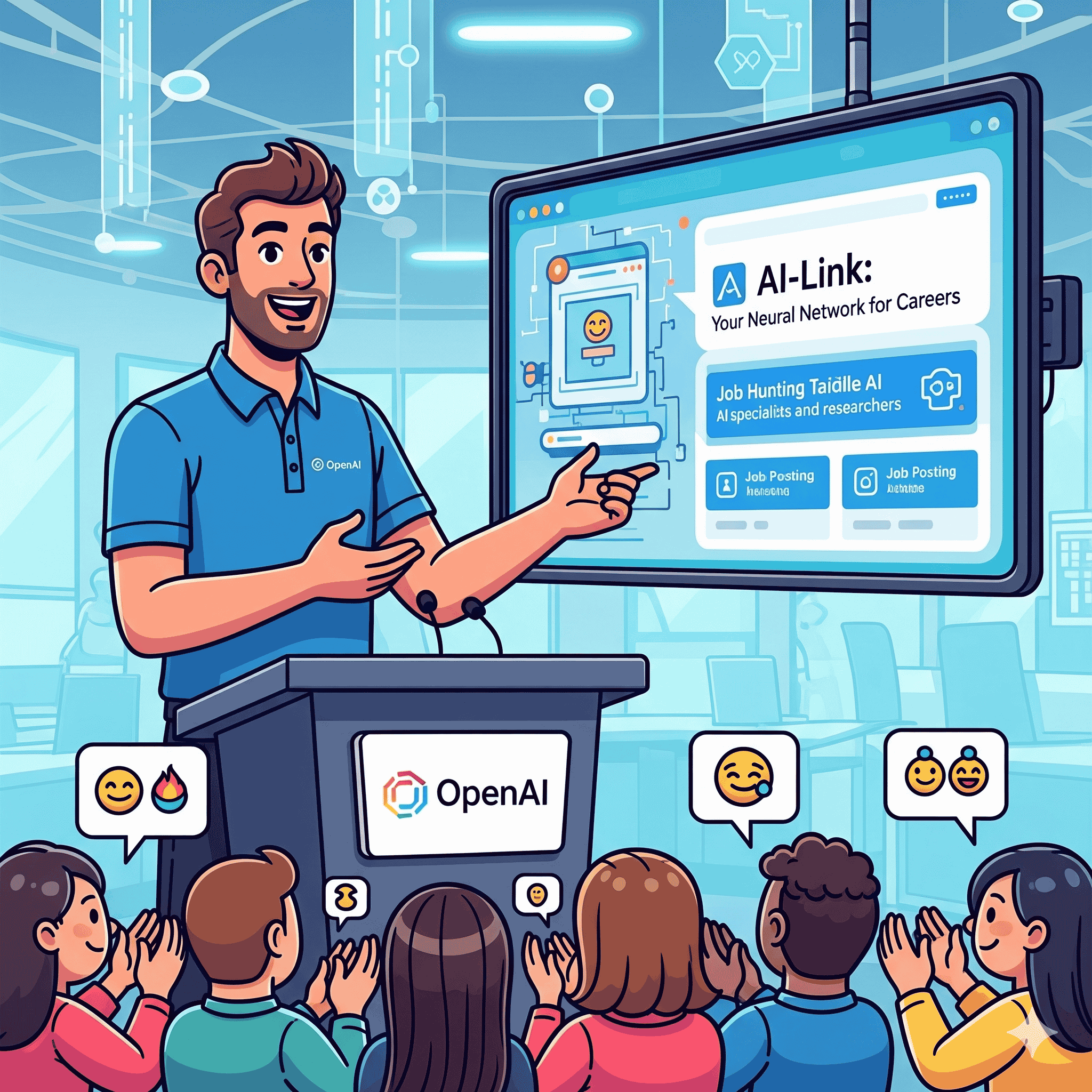
It was the year 2015. Saurabh was job hunting, unsure where to look. He went from company to company, sharing his resume. After months of trying, he finally managed to match what the market needed and landed a job at an MNC. His skills in computer applications and a master’s degree helped him secure the position.
If LinkedIn had been as popular back in 2015, he might not have faced so many challenges. He could have landed the job much earlier, with his skills matched to market demand.
The experience of millions of young people in India who had difficulty finding work, particularly those from resource-poor rural towns and villages, is reflected in Saurabh’s story. Many searched for the ideal opportunity for years.
An OpenAI manager recently revealed plans to introduce a LinkedIn-like platform that would make it simple for users to discover jobs without having to approach HR directly or submit applications one at a time.
Prior to this statement, 4.1 million job listings from firm websites were scraped by someone who was fed up with job ghosting. “I got tired and tired of how Indeed and LinkedIn are tainted with ghost jobs and third-party offshore agencies, making it nearly impossible to navigate,” he wrote in a Reddit post.
The automation approach developed by OpenAI seeks to match job seekers with positions that best suit their skill sets. Although it still significantly relies on manual recruiter work, LinkedIn currently provides a similar feature.
The more significant query is whether OpenAI can manage this procedure without creating further difficulties. Can it prevent mistakes that humans can readily identify and duplicate the complex recruiting decision-making process?
“Nuance is not understood by algorithms. Instead, they quantify patterns. They are unable to sense how determined candidates are to further their careers. They are unable to appreciate the tenacity of someone who perseveres in the face of repeated failures. They cannot capture the spark of creativity that can easily dwarf the gap on a resume,” says Kalpesh Banker, Managing Partner at EduShine Search Partner.
The risks are real and include algorithmic bias, hallucinations, and inaccurate data. Experts caution that AI’s use in hiring needs to be closely watched to avoid making expensive mistakes.

INDEED, LINKEDIN, NAUKRI.COM, AND CURRENTLY OPENAI
In the USA, LinkedIn was founded in 2002 with the intention of giving job seekers a platform. After entering India in 2009, the platform took almost ten years to become well-known.
Anyone wishing to establish their presence in the job market had to use LinkedIn by the end of the decade.
LinkedIn had become a must for anyone wishing to establish their presence in the job market by the end of the decade.
As of 2025, LinkedIn had more than 160 million users in India, and the figure is still growing. The first thing a student does when considering beginning their academic path is to set up a LinkedIn profile and establish connections with professionals in the field.
As of 2025, there were more over 160 million LinkedIn users in India, and the number continues to rise. Making a LinkedIn profile and connecting with professionals in the field is the first thing a student does when considering beginning their academic career.
Following LinkedIn, Indeed was introduced in 2004 as a job-hunting website where people could look for positions according to their qualifications and employers could advertise job opportunities to draw in qualified candidates.
AI can now scan resumes at the very first stage thanks to the system that most businesses use today; this trend started after COVID-19 and has persisted ever since.
AI systems now handle a major portion of the first screening process. Businesses prefer to use AI to make the hiring process quicker and simpler rather than manually searching for the best candidates, especially for lower and mid-level roles.
Because it can be difficult to choose the best applicant from thousands of resumes, Artificial Intelligence has emerged as the go-to option.
On websites like Indeed, LinkedIn, and Naukri.com, this approach is extensively utilized. According to a number of HR experts, these algorithms frequently reject resumes that were not created with adequate human intervention in the first stage.
Numerous additional job portals have joined the market throughout time to assist recruiters and job seekers.
OpenAI is now getting ready to take over and revolutionize the field.
OpenAI is anticipated to automate the entire process, helping recruiters and candidates find the best fit, rather than just posting jobs like Indeed and LinkedIn do.
Based on OpenAI’s prior innovations, like ChatGPT, the platform has the potential to drastically transform the hiring process and the HR-employee dynamic, even though the precise procedure has not yet been disclosed.
“If AI is properly developed, it can increase opportunities by revealing nearby or unusual matches that people might overlook. It could reduce careers to keyword matching if it is badly constructed. According to Raghav Gupta, Founder & CEO of Futurense, “the opportunity is in developing systems where AI expands the funnel and humans refine the final decision.”

CAN THE REAL PROBLEM BE SOLVED BY OPENAI?
Additionally, experts believe that subtleties are crucial when hiring new employees. Recruiters cannot rely entirely on AI to discover the perfect candidate, even though it helps streamline the process. Human participation is still essential.
According to our research, 40% of organizations use hybrid work, and 55% of organizations have fully returned to the office. Even though 80% of hiring practices incorporate AI, many efforts are still in the experimental stage. AI can expedite the hiring process, but it cannot take the role of human judgment, creativity, or context. Instead, it must support human decision-making, according to Balbir Singh, CEO of Great role To Work India.
Gaining confidence in AI is still quite difficult. In-person interviews are becoming more common in tech companies.
AI can only evaluate the content of the CV, even while skill-based screening and virtual shortlisting speed up the hiring process. It is unable to assess attributes that call for human judgment.
The OpenAI CEO has explained that the idea is simple: to help find perfect matches based on trained algorithms.
Problems occur if an algorithm malfunctions or an applicant submits a resume with an error; this can stop the process and AI might not pick it up.
Because of this, the following phase is vital and frequently causes organizations more trouble.
“Context still needs to catch up with AI’s enormous power at scale. As technology advances, a hasty decision made months ago can suddenly become flawed. Businesses are starting to realize that relying too much on AI without a human component might have unexpected effects, says Balbir.
Creating resumes and profiles that are machine-readable and optimized for AI screening technologies is one of the largest challenges that job seekers encounter.
Opportunities can be presented without obstacles with the use of a well-prepared CV. It entails actions like leveraging the language of the job description, mentioning projects and tools, and making resumes machine-readable.
Depending on the position, several CV versions might showcase different strengths.
“Proof of work, like links to portfolios or GitHub, also helps AI pick up signals beyond plain text,” Raghav explains.
AI’s main obstacles continue to be bias and data quality.
“OpenAI is going to change the way opportunity and talent interact. The hiring process is smooth for all parties since, in contrast to traditional job portals, it can provide recruiter-driven job descriptions combined with AI-crafted CVs that are customized to match, according to Abhishek, Director HR, BSI.
Human involvement is still essential, but OpenAI can provide governance, audit, and accountability that people occasionally overlook. Although AI can improve the final choice and provide a layer of confidence, human verification will always be necessary.
Abhishek goes on to describe how OpenAI’s platform can revolutionize the industry: “The OpenAI platform will be more important since it will search the entire web and finish the process. However, the type of data being supplied into it also has a role.
The challenge, experts note, is that while AI can identify talent, placing that talent in the right role within an organisation remains difficult.
They contend that an IIM Indore graduate might be more qualified for a position than an IIM Ahmedabad graduate, but AI may not identify that applicant if it is taught on a limited set of algorithms.
Higher-level positions demand far more human monitoring and careful hiring.
“We must take bias based on training data into consideration if we are utilizing AI to find applicants. Regarding AI bias, Ankur Agarwal remarks, “For instance, giving preference to candidates from older IIMs (such as IIM A, B, or C) for leadership roles—because the alumni of the newer IIMs have just begun to assume leadership roles and have a lower representation in training data.”
Similarly, even though there is an increase in skill from smaller towns, candidates from metro areas may be given more weight.
“The solution will require manual quality checks and supplementing AI search with recruiter-led efforts,” says Ankur.
AI may make job searching more intelligent, but it won’t make it any simpler unless the market itself provides the correct chances.
OpenAI’s entry into recruitment is expected to streamline hiring for mid-level and entry-level roles, reducing the time spent filtering through thousands of CVs.
However, researchers caution that depending on training data, AI systems can inadvertently favor particular profiles, resulting in bias. Human judgment will probably always be used in leadership and senior jobs because these positions need for context, intuition, and nuanced assessment.
The takeaway for job seekers is straightforward: keep your resume up to date and polished, emphasize quantifiable abilities, and stay in step with market trends so that algorithms recognize your profile.
Employers, meanwhile, must strike a balance between automation and human decision-making to ensure that hiring remains transparent, fair, and inclusive. AI may enable efficiency, but the human touch will ultimately decide the right fit.
For breaking news and live news updates, like us on Facebook or follow us on Twitter and Instagram. Read more on Latest Education on thefoxdaily.com.






COMMENTS 0